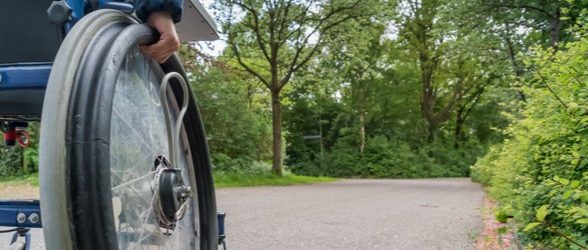Why Disability Advocacy on a Local Level Matters
With so many national political events rapidly unfolding, it can feel like what you’re doing on a local level in your community “doesn’t matter.” I’m here to tell you otherwise. It actually matters a LOT, especially for the disability community.
While an assortment of federal laws, regulations, and caselaw protect disability rights, the fact is that your access is only as good as what your community provides. If you live in a disability-friendly community, your city will prioritize things like physical accessibility, consulting disabled people on policies that matter to them, and promoting affordable accessible housing, education, and other resources. If you don’t, life can be a real slog.
But a lot of us live in what I think of as “disability indifferent” communities. It’s not that they’re hostile, but more that no one has ever thought about issues that might matter to disabled residents, who often seem largely invisible. Doing advocacy work in those communities can have a tremendous impact.
The best part is that disability is nonpartisan — I work with city council members in the City of Fort Bragg who don’t share my political beliefs overall, but we both agree that disabled people have a right to live in society, and that we can work together to make that happen.
So how do you get involved on a local level?
It often starts with showing up at city council and committee meetings where people are discussing issues relevant to the disability community. You can find out when things that matter to you are on the agenda by requesting copies from the city — many post them online, and city staff can also directly reach out via email or phone to let you know about upcoming agenda items.
While your physical presence can have a bigger impact, if you can’t make it to a meeting or don’t want to go in person, you can also submit comments prior to the meeting. Some cities broadcast meetings live and the minutes are generally made available by law, so you can read and comment on them after the fact, too.
Let me give you an example of the impact you can have on a local level by taking you back to the the fall of last year, when our Community Development Department started presenting updates to the Inland Land Use and Development Code, a really critical document, to the city council. This document covers things such as how many accessible parking spaces buildings are required to provide and who pays to retrofit sidewalks during construction.
I noticed something in a section on definitions.
Service Animal. A dog or miniature horse that provides services to a differently abled individual under the auspices of the American with Disabilities Act. Excludes companion animals which are separately regulated under Article 4 Animal Keeping.
Two things struck me here.
The first was the phrase “differently abled,” which was a popular disability euphemism at one point, but feels antiquated and even offensive now. Enshrining it in the city code seemed like a bad idea not only on general principles, but also because the terms and definitions used in city codes should match those used in state and federal code for consistency.
The second was the lack of commentary on therapy or emotional support animals (ESAs). This definition was actually added to the code in response to concerns about attempting to secure ADA protections for ESAs, so it seemed like a good idea to specifically namecheck them.
So I got up at the meeting and commented, explaining that the city should consider replacing “differently abled” with a more legally consistent term — “disabled person” or “person with disabilities” — and that it explicitly name and define ESAs.
The Community Development Director thanked me for my comments, took some notes on what I had to say, and asked if she could follow up if she had questions. I said “of course,” and as the city rolled out the next draft of the code, I was pleased to see that changes were being made.
This might seem like a tiny victory, but it illustrates that advocating on the local level does make a difference, for present and future residents.
Moreover, flagging disability for the attention of city staff and council members also meant that they started asking questions — particularly around program eligibility for grants. Now, I’m working with city staff to help them better serve the disability community, all because I was willing to say something at a meeting.
About Rooted In Rights
Rooted in Rights exists to amplify the perspectives of the disability community. Blog posts and storyteller videos that we publish and content we re-share on social media do not necessarily reflect the opinions or values of Rooted in Rights nor indicate an endorsement of a program or service by Rooted in Rights. We respect and aim to reflect the diversity of opinions and experiences of the disability community. Rooted in Rights seeks to highlight discussions, not direct them. Learn more about Rooted In Rights




A recent situation in my life, where managing daily tasks became increasingly challenging due to a disability, has prompted me to consider seeking assistance from a disability support service. The practical difficulties I encountered underscored the necessity of finding specialized support to enhance my overall well-being and independence. Btw, it’s quite inspiring that you mentioned how in a community that is disability-friendly, your city will give priority to issues such as cheap accessible housing, education, and other services; it will also engage with persons with disabilities on policies that affect them.